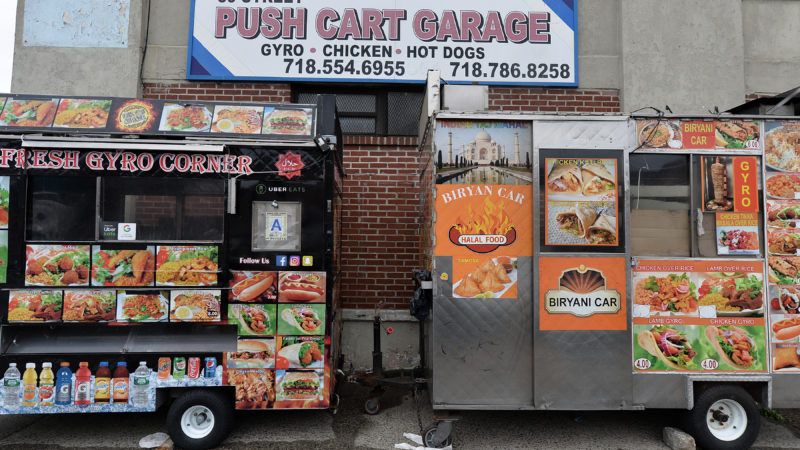New York City Cops Will Finally Stop Targeting Street Food Vendors
But it's not enough. NYC needs to unleash its food vendors.

The police in New York City will stop overseeing and ticketing street food vendors, Mayor Bill de Blasio announced this week. Responsibility for enforcing mobile vending rules will reside with other departments, including health, sanitation, and parks.
This is an overdue and welcome move. Police have made life hell for decades for vendors in the city. In 2015, for example, the NYPD issued nearly 19,000 tickets to vendors.
Vending without a permit, The New York Times notes, is illegal, and puts vendors "at risk of fines, property confiscation and arrest." Many of the people put at risk by these policies are immigrants and people of color. Even before nationwide protests erupted over the murder of George Floyd by Minneapolis police last month, New Yorkers were questioning police tactics for dealing with street vendors.
For example, police arrested at least two churro vendors operating in city subways in November for selling food without a permit. That same month, a viral video captured four policemen appearing to pin, kneel on, and arrest an African American man who allegedly was selling candy in the subway.
The video of vendor Byron Shark's violent arrest is reminiscent of video of George Floyd being killed by Minneapolis police last month and of video showing NYPD pinning and killing vendor Eric Garner in 2014. Shark, who alleges the police injured him needlessly, has announced plans to sue the city for $5 million.
These arrests, Grub Street reported last year, became "a flash point in the conversations about ramped-up subway policing and food vendors."
Some, though, were unmoved by the arrests. New York Post columnist Bob McManus argued the vendors' arrests mostly illustrated the need for more law and order.
"[O]ver time minor infractions add up to major disruptions, especially when committed by persons who show no particular respect for law in the first place," he wrote, echoing the draconian policing strategies advocated by former New York City mayor Rudy Giuliani. "Churro-hawking is no big deal," McManus later admits in his column. In other words, McManus believes arresting street vendors will teach them to "respect" laws that criminalize peaceful sales of tasty foods, sales which even McManus admits are "no big deal." (I disagreed.)
While the city's plan to shift vending-enforcement duties away from city police is a welcome change, it doesn't address "the root of the problem," the New York Daily News rightly noted this week. "The city has a decades-long cap on street vending [permits] that makes it all but impossible for a new vendor to break into the business."
Indeed, New York City's renewable, bi-annual permit ceiling has been capped at just over 3,000 for decades, I explained in a 2011 article for Reason's print magazine. (City permits, which are capped, are generally required for all trucks, stands, and carts. Licenses, which are not capped, are generally required for people who work at those trucks, stands, and carts.) That artificially low cap forces thousands of interested city vendors either to operate without a permit, which is illegal, or to buy a permit on the black market, which is also illegal.
As I've detailed time and again, New York City has a long and shameful history of idiotic crackdowns on all sorts of foods and eaters—from foragers to soda, foie gras, salt, and those who would share food with the homeless and hungry.
This week's move by Mayor de Blasio is a positive one that should de-escalate dangerous and needless confrontations such as that between police and candy vendor Byron Shark. But it falls far short of giving New York City's great street food vendors what they most need: the freedom to operate legally in the city.


Show Comments (36)